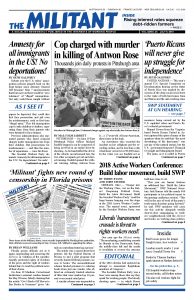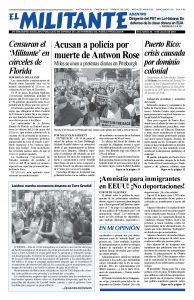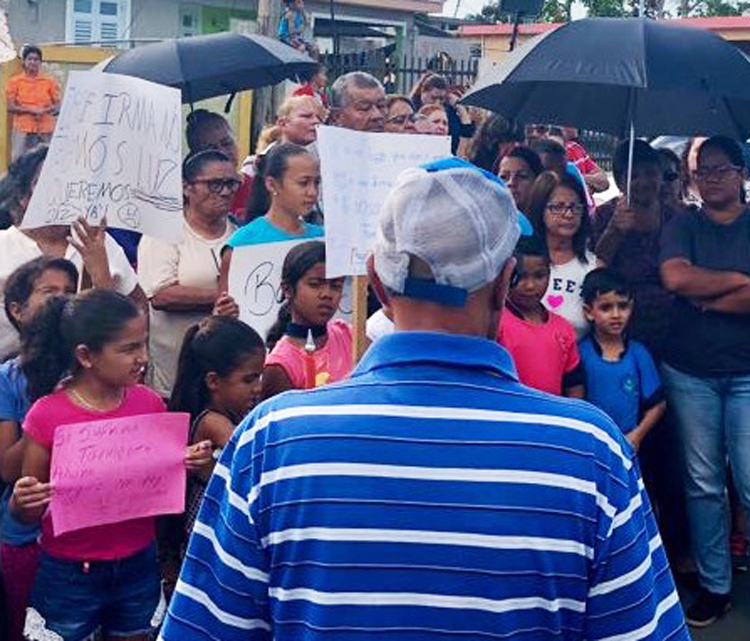UNITED NATIONS — This year’s annual U.N. Special Committee on Decolonization hearing on the status of Puerto Rico was marked by discussion of the deep social crisis there in the wake of both hurricanes Irma and Maria and the anti-working-class measures being carried out by the U.S. capitalist rulers and Puerto Rico’s colonial government.
Manuel Rivera from the Virginia-based Puerto Ricans United in Action captured the spirit of many of the speakers when he said that “the most devastating of the hurricanes” was not any of the natural storms, but the U.S. government-imposed Financial Oversight and Management Board.
The junta, as it is called in Puerto Rico, has ordered the colonial regime to deepen and speed up measures that make working people bear the brunt of the capitalist economic crisis and pay for the Puerto Rican government’s $74 billion debt to wealthy bondholders.
Among the anti-worker measures imposed by the junta and the colonial regime, many of the speakers pointed to the reduction of pensions for government employees, high unemployment, price increases for water and electricity, higher tuition at the University of Puerto Rico and the closing of hundreds of public schools. At the same time, thousands on the island still have no electricity almost 10 months after Hurricane Maria.
Oscar López, who spent 36 years in jail for his activities in support of independence for Puerto Rico, was the first speaker. “Puerto Ricans will never give up struggling for an independent and sovereign Puerto Rico,” he said. Like a number of other speakers, he called for an independent audit of the debt.
“More than 15,000 families are still without electricity,” Ángel Figueroa Jaramillo, president of the UTIER electrical workers union, told the hearing. Figueroa noted that the colonial regime, under pressure from the junta, is planning to sell the public electric utility. “The sale of a utility like the Electric Energy Agency, the social patrimony of the Puerto Rican people, to the private sector would only worsen the situation that our population is facing,” he said.
The junta, which was appointed by President Barack Obama in 2016, “operates in plain view, without any shame, like a dictatorship,” said María de Lourdes Santiago, vice president of the Puerto Rican Independence Party. “To add salt to the wound, the measures imposed by the junta have not meant any material progress or fiscal stability for our country.” The measures aim to “resolve the problems of colonialism, with more colonialism,” she said.
Nina Dimarie Valedón Santiago, a former city council member in Caguas and now the executive director of the Patriotic Alliance, noted that “in municipalities like Yabucoa, 60 percent of the population does not have electricity.” Most of the speakers at the hearing are partisans of independence of Puerto Rico, but Valedón is a member of the Popular Democratic Party (PPD), which backs some form of “Commonwealth” status with Washington.
Today even leading members of the PPD agree that Puerto Rico is a U.S. colony. The U.S. government “lied to the United Nations General Assembly on Nov. 27, 1953, when it claimed that Puerto Rico had achieved self-government,” Valedón said. She demanded Puerto Rico be included on the U.N. list of colonial territories.
Washington’s ‘crass negligence’
Speaking for the National Hostosiano Independence Movement, Wilma Reverón Collazo said that “more than the devastation of the hurricanes, it was the crass and criminal negligence of the U.S. government and its administrators in the colony who have the main responsibility” for the thousands of deaths and ongoing social catastrophe.
Jocelyn Velázquez of the Socialist Front noted that much of the so-called aid from Washington for hurricane recovery “ends up directly in the hands of U.S. companies that charge rates up to 20 times more than the market price for goods and services.”
Since the hurricane, there has been “no dialysis, no treatment for cancer patients, no maternity ward” on the island of Vieques, Myrna Pagán Gómez, from Vieques Lives Matter, told the hearing. “Nine months after the tempest only emergency service is offered in a war zone style tent.”
“We tested our mettle against the most powerful military machine in history,” she said, recalling the victory in the decadeslong fight to get the U.S. Navy to shut down the base and firing range there. “We will struggle on and never give up the struggle for our homeland.”
SWP: We face a common enemy
“The hurricane’s impact was not primarily a natural disaster,” said John Studer, speaking for the Socialist Workers Party in the United States, but “a social catastrophe, created by colonial domination and capitalist rule.” Studer, who is editor of the Militant, recently returned from a fact-finding trip to Puerto Rico, where he met working people in Humacao, Yabucoa and San Juan.
“My party demands: Cancel the immoral debt!” (Studer’s full remarks are printed alongside this article.)
All told, over 40 groups spoke to the commission, urging the U.S. government be forced to end its colonial domination over Puerto Rico.
For the 37th time since 1972, the committee approved a resolution reaffirming “the inalienable right of the people of Puerto Rico to self-determination and independence,” again calling on the U.N. General Assembly to take up the question as soon as possible. The resolution was co-sponsored by the governments of Cuba, Bolivia, Antigua and Barbuda, Ecuador, Nicaragua, Venezuela, Syria and Russia.
“More than 120 years of colonial domination have not been enough to take away from the Puerto Rican people their culture, identity, language and national feelings,” Anayansi Rodríguez Camejo, Cuba’s ambassador to the U.N. said, motivating the resolution. “That by itself proves the inalienable vocation for independence that is sunk deep in this Latin American and Caribbean island.”


